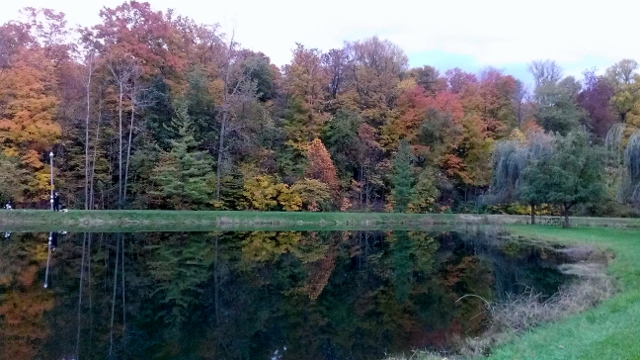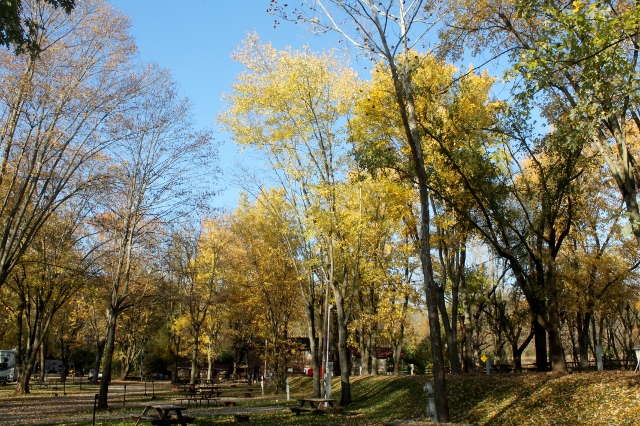Written by: Jeremy
How do full time RVers get mail? This question has to be the most frequent question that we get from people when they find out we are living on the road in an RV. I guess this question always strikes me as odd, primarily because this was a very easy thing to figure out and unlike a lot of things, not really a big deal.

Holiday cards and business checks aside, we have zero mail communication with anyone these days. In fact while visiting an old friend and coordinating the meeting trough instant message, email and text, we had a laugh talking later about how neither one of us could even remember how anyone use to coordinate anything before cell phones and computers. Even less than twenty years ago, the world was a completely different place. Then again, “How will we get our mail?” was one of our first questions too, so we do completely understand why people always ask.
I think a home address is part of an identity for people within a society. Whether it is an apartment you rent, the detention center you are sentenced to, or one of the multiple homes you own, your personal mailing address is a universal social code in our society. It identifies you with a specific state, city, region, community, tax status etc. The thought of not having one makes you feel exposed.
I think at least for some, there is also this belief that the US postal service would still be our last line of communication, or way to reach someone in the event of some sort of earth shattering event or apocalyptic scenario affecting the delicate web of satellite constellations and fiber optic wires that we all rely on for daily communication. I am somewhat amused by the notion that even if the World Wide Web is down and even if the satellite and cell networks have completely collapsed, an old man with two knee braces will still come trudging up our drive every day to deliver mail. If nothing else, the fact that people do have this thought is a testament to a very successful information delivery process that has stood the test of time but that might also be on its way into history. Neither snow nor rain nor heat nor gloom of nuclear holocaust stays these couriers from the swift completion of their appointed rounds. I guess if you consider sending a piece of a harvested tree by gasoline truck and human legs for thousands of miles swift, then maybe this form of communication still makes sense to you.
Joking aside, we quickly found that a number of companies provide mail forwarding services for a monthly or yearly fee. We use Good Sam Mail Service. You just sign up, and then your mail is forwarded to an assigned box address in Florida. The Florida based service sorts our mail, weeds out junk and then sends us an email telling us what is left. We then look online and tell them if we want them to pitch it, ship/mail it to our current location (wherever that may be), or they will also open it and scan the contents and send it to us electronically if we want. Most of our regular mail and bills can already be sent and paid electronically and we made sure to sign up for all that are available. So that is the answer to the question but not the answer to the full question.

I think while most people are asking questions like “how do you get your mail?”. We realize a lot are also at least internally asking “how do you not have a permanent home?” For every person reading this and saying they wish they could do what we are doing there are probably three that shutter at the thought of waking up every morning in a strange town, surrounded by strangers that you don’t know and that you certainly don’t trust. Logistics aside, one thing we are finding out quickly is that nomads don’t really think like that and neither do most campers and RV’ers. At least not the ones we are meeting.
I have lived for years in a city apartment where I never once spoke to the guy whose door was directly across the hall from mine. I have had houses where I have neighbors that I share a fence with and that I never even knew their names. We have not found this to be the case in the campgrounds and RV parks we have visited in the last year. More accurately I would say that we can go through a half dozen new next door neighbors in a couple weeks and we will probably feel at least somewhat like we know all of them. In some of the tighter parks you can get to know them without even meeting them.
Overall, I think full-timers are a pretty care free bunch that generally trusts one another and assumes the best from those around them. People are friendly and always willing to help each other out. In other words the very thing that scares people the most about this lifestyle seems to be a non-issue for those of us drawn to and living in it.
I have noticed that the only real curmudgeons at camp grounds are those people that have permanently built porches around their campers and that live in the same spot year round. They are the ones complaining about a dog that looks like a Pit Bull or someone’s music being too loud. They seem to have developed general distrust, distain and fear of everyone around them. Those of us just passing through seem to find fun and commonality just about everywhere we go and with everyone we meet.
I am not exactly sure why that is the case. It might just be the type of people that are nomadic RVer types. Maybe it is because nomads know they only have to spend a couple of nights enduring the county music blaring from the too close and spatially incognizant next door neighbor. That may even lead to a joke or two shouted in jest from one late night camp fire over to another, or even a new friend with a wildly different taste in music but that you soon find has a very similar love for and cooler full of good Pale Ale.
When you know that you will only be somewhere a couple of nights and not years, that yappy Pomeranian next door might just make you laugh instead of leading to an incident where the neighbors have to record the event on their cell phones for use as evidence in a future law suit. Even if you don’t live like a nomad, thinking about your neighbors the way nomads do might be a good idea for a few more people in our society.
RV Lesson #6: In the end, like most things in life, a permanent address is just a set of values that has no real value. A home and a community are real and something that everyone needs and that full-time RV’ers do not do without.


How Do Full Time RVers Get Mail?
Written by: Jeremy
How do full time RVers get mail? This question has to be the most frequent question that we get from people when they find out we are living on the road in an RV. I guess this question always strikes me as odd, primarily because this was a very easy thing to figure out and unlike a lot of things, not really a big deal.
Holiday cards and business checks aside, we have zero mail communication with anyone these days. In fact while visiting an old friend and coordinating the meeting trough instant message, email and text, we had a laugh talking later about how neither one of us could even remember how anyone use to coordinate anything before cell phones and computers. Even less than twenty years ago, the world was a completely different place. Then again, “How will we get our mail?” was one of our first questions too, so we do completely understand why people always ask.
I think a home address is part of an identity for people within a society. Whether it is an apartment you rent, the detention center you are sentenced to, or one of the multiple homes you own, your personal mailing address is a universal social code in our society. It identifies you with a specific state, city, region, community, tax status etc. The thought of not having one makes you feel exposed.
I think at least for some, there is also this belief that the US postal service would still be our last line of communication, or way to reach someone in the event of some sort of earth shattering event or apocalyptic scenario affecting the delicate web of satellite constellations and fiber optic wires that we all rely on for daily communication. I am somewhat amused by the notion that even if the World Wide Web is down and even if the satellite and cell networks have completely collapsed, an old man with two knee braces will still come trudging up our drive every day to deliver mail. If nothing else, the fact that people do have this thought is a testament to a very successful information delivery process that has stood the test of time but that might also be on its way into history. Neither snow nor rain nor heat nor gloom of nuclear holocaust stays these couriers from the swift completion of their appointed rounds. I guess if you consider sending a piece of a harvested tree by gasoline truck and human legs for thousands of miles swift, then maybe this form of communication still makes sense to you.
Joking aside, we quickly found that a number of companies provide mail forwarding services for a monthly or yearly fee. We use Good Sam Mail Service. You just sign up, and then your mail is forwarded to an assigned box address in Florida. The Florida based service sorts our mail, weeds out junk and then sends us an email telling us what is left. We then look online and tell them if we want them to pitch it, ship/mail it to our current location (wherever that may be), or they will also open it and scan the contents and send it to us electronically if we want. Most of our regular mail and bills can already be sent and paid electronically and we made sure to sign up for all that are available. So that is the answer to the question but not the answer to the full question.
I think while most people are asking questions like “how do you get your mail?”. We realize a lot are also at least internally asking “how do you not have a permanent home?” For every person reading this and saying they wish they could do what we are doing there are probably three that shutter at the thought of waking up every morning in a strange town, surrounded by strangers that you don’t know and that you certainly don’t trust. Logistics aside, one thing we are finding out quickly is that nomads don’t really think like that and neither do most campers and RV’ers. At least not the ones we are meeting.
I have lived for years in a city apartment where I never once spoke to the guy whose door was directly across the hall from mine. I have had houses where I have neighbors that I share a fence with and that I never even knew their names. We have not found this to be the case in the campgrounds and RV parks we have visited in the last year. More accurately I would say that we can go through a half dozen new next door neighbors in a couple weeks and we will probably feel at least somewhat like we know all of them. In some of the tighter parks you can get to know them without even meeting them.
Overall, I think full-timers are a pretty care free bunch that generally trusts one another and assumes the best from those around them. People are friendly and always willing to help each other out. In other words the very thing that scares people the most about this lifestyle seems to be a non-issue for those of us drawn to and living in it.
I have noticed that the only real curmudgeons at camp grounds are those people that have permanently built porches around their campers and that live in the same spot year round. They are the ones complaining about a dog that looks like a Pit Bull or someone’s music being too loud. They seem to have developed general distrust, distain and fear of everyone around them. Those of us just passing through seem to find fun and commonality just about everywhere we go and with everyone we meet.
I am not exactly sure why that is the case. It might just be the type of people that are nomadic RVer types. Maybe it is because nomads know they only have to spend a couple of nights enduring the county music blaring from the too close and spatially incognizant next door neighbor. That may even lead to a joke or two shouted in jest from one late night camp fire over to another, or even a new friend with a wildly different taste in music but that you soon find has a very similar love for and cooler full of good Pale Ale.
When you know that you will only be somewhere a couple of nights and not years, that yappy Pomeranian next door might just make you laugh instead of leading to an incident where the neighbors have to record the event on their cell phones for use as evidence in a future law suit. Even if you don’t live like a nomad, thinking about your neighbors the way nomads do might be a good idea for a few more people in our society.
RV Lesson #6: In the end, like most things in life, a permanent address is just a set of values that has no real value. A home and a community are real and something that everyone needs and that full-time RV’ers do not do without.
Leave a comment
Posted in General Commentary, Jeremy Blog, Live, Uncategorized
Tagged how full time rvers get mail, mail forwarding service, rv mail service